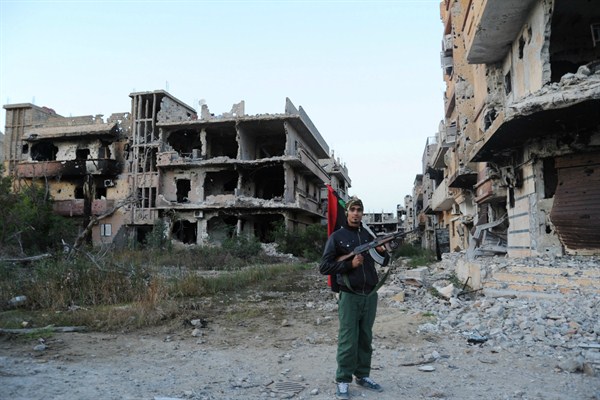Last week, U.S. warplanes bombed the Libyan town of Sabratha, targeting militants of the self-declared Islamic State. The move is the most recent illustration of the dilemma presented by Libya’s political and security stalemate, characterized by political infighting and militia violence. The Islamic State’s emergence in the country in early 2015 has given the situation regional implications. The United States is weighing its next steps, amid ongoing questions about its role in the 2011 NATO intervention that some see as the source of today’s chaos.
The following articles are free for nonsubscribers until March 17.
Stabilizing a Chaotic Libya
Libya’s Power-Sharing Deal Is a Race Against Time—and Against ISIS
In December, Libya’s two rival parliaments signed a United Nations-brokered deal to form a national unity government and hopefully halt the country’s long descent into unrest and civil war. But almost a month on, Mattia Toaldo wrote in January, the agreement’s prospects are decidedly mixed, with threats growing from the Islamic State.
United Nations-led talks to resolve Libya’s unrest were undermined by exposed links between outgoing U.N. mediator Bernardino Leon and the United Arab Emirates, which openly backs one side of the civil war. In November, Mattia Toaldo wrote that, if Leon’s successor, Martin Kobler, can accomplish Leon’s unfinished business—brokering a cease-fire, reaching an agreement between Libya’s two parliaments, and leveraging the position of regional powers—all hope won’t be lost.
Four years after the revolution began to overthrow Moammar Gadhafi’s regime, a new threat emerged in Libya: militants affiliated with the Islamic State. But, Mohamed Eljarh wrote last February, the group’s advance must be understood in the wider context of Libya’s civil war, and Libyans cannot tackle it alone.
Unresolved tensions, militia violence and the entry of the Islamic State have exacerbated an already-perilous security climate in Libya. Only one option, Steven Metz wrote last February, could even theoretically turn Libya around: a U.N. protectorate. But, he wrote, there are very few nations with enough surplus military power to commit to what could be a very long-term operation.
Regional Implications
Italy set out to own the West’s response to Libya’s turmoil, Mattia Toaldo wrote last June, but the conflict there became too large for Rome to handle. Yet, he added, longstanding ties and the migrant crisis rooted in Libya’s unrest make finding a solution more important than ever to Italian Prime Minister Matteo Renzi’s political fortunes.
Last February, Islamic State-affiliated militants in Libya brutally executed 21 Egyptian Coptic Christians. At the time, Nick Gvosdev wrote that the horrific murders highlighted the threat that Europe faces to the south—and also served as a reminder that the operation to depose Gadhafi, once praised as a successful example of the responsibility to protect doctrine, has had some dangerous consequences.
Water scarcity is becoming a political issue, creating new opportunities for “water diplomacy,” Russel Sticklor wrote last June. But over the past three years, as a result of its deteriorating security situation that only worsened last year, Libya has been markedly absent from joint regional efforts to develop a massive aquifer. As its security situation becomes increasingly unstable, Libya’s behavior on all strategic matters, including water, will likely become less predictable.
Washington’s Perspective
More than a year after the Islamic State’s arrival in Libya, some are making the case for a U.S. military intervention. The Obama administration has largely resisted those calls, but should not hesitate to act, Michael Cohen wrote in February. In doing so, it should acknowledge that the whack-a-mole fight against terrorist groups will be part of U.S. national security policy for years to come.
Hillary Clinton’s presidential campaign has brought the 2012 attack on the U.S. embassy in Benghazi—in which four Americans died—back into the spotlight, and spurred a debate over whether the U.S. should have intervened in the first place, a move that Clinton supported. But, Michael Cohen argued in November, assessing the decision in hindsight is less useful than evaluating whether it was a strategic move at the time.
Is Clinton Taking the Fall for Obama’s Libya Missteps?
Following two recent New York Times articles criticizing Hillary Clinton’s role in the Obama administration’s intervention in Libya, Michael Cohen wrote that, in fact, the pieces suggest a greater indictment of President Barack Obama’s missteps on Libya. And while Clinton may have been too willing to intervene militarily without considering the consequences, Cohen added that her push was not just for U.S. intervention, but also for follow-up—“the best choice among a bad set of options.”
Following two recent New York Times articles criticizing Hillary Clinton’s role in the Obama administration’s intervention in Libya, Michael Cohen wrote that, in fact, the pieces suggest a greater indictment of President Barack Obama’s missteps on Libya. And while Clinton may have been too willing to intervene militarily without considering the consequences, Cohen added that her push was not just for U.S. intervention, but also for follow-up—“the best choice among a bad set of options.”

